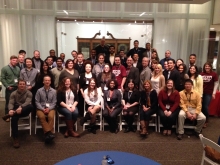2014 Ivy Returning Students Conference Activates Connections Beyond the Ordinary

On a chilly Saturday in February, students from Harvard, Columbia, Brown, Yale, and Penn gathered at the second annual 2014 Ivy Returning Students Conference, held at the Kislak Center. They were there to share insights and stories gleaned as “non-traditional” students in the Ivy League: adults returning from many walks of life to pursue their bachelor’s degrees at the nation’s most elite universities.
And their stories are pretty interesting. “When we get together, it’s an incredible variety of life experiences,” says conference organizer Cory Boatwright. Boatwright is a senior in Penn’s Liberal and Professional Studies (LPS) program, Penn’s B.A. program for students over 21. “We have people who are professional ice skaters, dancers, a concert pianist, businessmen, and people like me in the military.”
Students are arriving at elite universities to complete their undergraduate education after the age of 21 with more and more frequency, according to Kathy Urban, director of the LPS B.A. program. She says that these students, whether called “non-traditional,” “returning,” or “adult,” are the face of the future of education.
“Life circumstances and the cost of education are bringing more students to their college education after the age of 21,” Urban says. “They come with a great deal of knowledge based on experience in the work world and in life. I really do believe they're going to be the leaders of tomorrow.”
The conference, Urban says, acknowledges this unique community in empowering ways. “They're enhancing the work they do at their home institution by creating a larger network. When you're able to harness your experiences in an Ivy League institution and then connect with similar students at other elite institutions, it’s very powerful.”
For Boatwright, the conference is also an opportunity to reflect on the challenges presented by being a returning student. He is the founder of the LPS Student Association, which he created as a meeting space for returning students to address problems they faced balancing school and work, and re-entering academia after years away.
“As an adult student, you’re simply on a different schedule than many of your younger peers,” Boatwright says. “So integration can be a problem. Also, we’re always seeking more awareness for our presence and value on campus. We support one another in identifying ways in which we want the university to help, and also in pushing ourselves to participate in as many of the opportunities on campus as possible.”
The student association has been successful in its aims—so successful, Boatwright laughs, that membership is dropping. “What we've found is that we've been so good at helping out that fewer people are coming to our meetings because they face fewer problems. It’s actually great.”
The conference is an extension of Boatwright’s work in the student association—a chance for non-traditional students to network and reflect on their experiences. Last year, he coordinated with Yale’s Eli Whitney Program to put on a conference for Ivy League returning students. After a successful first round, he brought the conference to Penn this year.
“We went from 16 to 70 people this year. All five Ivy schools that offer programs for non-traditional students participated, and it was a great time. It’s a good opportunity to practice those skills in networking and advocating for themselves, that so when they go back to their respective campuses they can be more confident in doing so.”
Boatwright looks forward to a future in which returning students will continue to become a greater part of the student population.
“In the future, I really believe younger people will be in class with older people, as more people take time off to work before their education. Whatever people's stories are going to be, that's where it's trending. And I believe education as a whole will benefit from our blend of experiences.”





